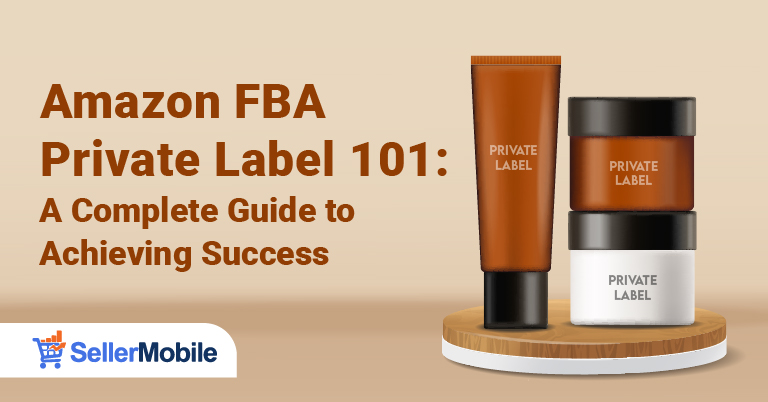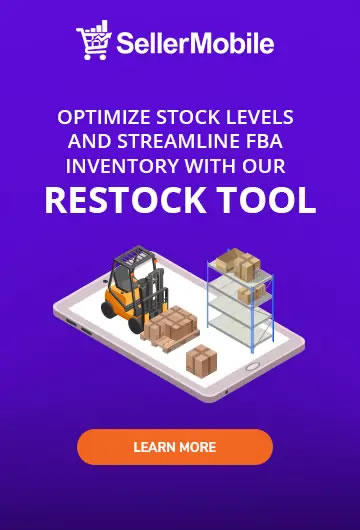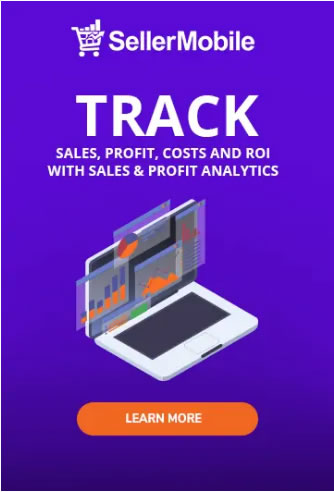Are you interested in starting an affordable online business of your own? Look no further! Many entrepreneurs have achieved great success by selling private label products on Amazon, and you can too.
This business model involves creating your own brand and selling products obtained from third-party manufacturers. It may sound straightforward, but it’s also incredibly lucrative.
The private label market has been booming, with a growth rate of 11.2% in 2022, resulting in $228.6 billion in sales across all channels, according to the private label Manufacturers Association report. In fact, nearly one out of every five grocery products sold in the US is a private label or store brand product.
Now, you might be wondering how to begin your Amazon FBA private label journey. In this comprehensive guide, we will provide you with all the information you need to find and source profitable products, create your brand, and successfully launch your products on Amazon.
By the time you finish reading this article, you’ll have a clear roadmap to kickstart and expand your own Amazon FBA private label business.
Let’s dive into the world of Amazon FBA private label and understand its significance before delving into the specifics of selling these products.

Private label businesses involve sellers offering products from third-party manufacturers under their own brand. This grants them complete control over the product, allowing customization of brand logos, packaging, labels, and even pricing. Moreover, they have autonomy over marketing and advertising efforts.
In the realm of e-commerce, Amazon FBA plays a crucial role. FBA stands for Fulfillment by Amazon, a service where Amazon handles the entire fulfillment process. Sellers can entrust Amazon with storage, packing, shipping, and customer service. By simply sending their products to Amazon’s warehouses, sellers can focus on other aspects of their business.
Combining Amazon FBA with private label offerings presents immense advantages for online sellers. They gain access to Amazon’s vast customer base, leveraging the trust and credibility the platform has garnered over the years. Additionally, Amazon FBA private label allows sellers to establish their own brand identity and stand out from competitors. In summary, Amazon FBA private label presents a low-risk, high-reward opportunity to kickstart an online business.
Discover the compelling reasons to sell private label products on Amazon and unlock a world of opportunities. Explore the benefits below:

1. Full Ownership of Your Brand: With a private label brand, you have complete control and decision-making power. Unlike arbitrage or wholesale models, where you resell other brands’ products, you can independently shape your business, focusing on marketing and exceptional customer service to strengthen your brand and foster loyalty.
2. No Brand Restrictions: Selling private label products eliminates the need for brand approval. Unlike reselling items from other brands, which may be limited by Amazon’s Brand Gating feature for counterfeit management, you have the freedom to sell products under your own brand name.
3. Enhanced Opportunities on Amazon: By selling private label products under your brand, you gain access to a multitude of valuable opportunities on Amazon. These include Brand Registry, Sponsored Brands, Amazon Storefront, Amazon Live, Virtual Bundles, Amazon Attribution, Amazon Brand Analytics, and more. Effectively leveraging these options enables efficient targeting of your desired audience, improved product performance assessment, and enhanced conversion rates.
4. Customization Potential: Analyzing customer reviews and frequently asked questions about your own and competitor products allows you to identify areas for improvement. By implementing modifications based on these insights, you can stay ahead of the competition and create exceptional products that resonate with your customers.
5. Increased Profit Margins: Sourcing products directly from manufacturers or suppliers grants you control over the Costs of Goods Sold (CoGS). You can negotiate favorable pricing and terms, avoiding middlemen fees or commissions. Additionally, you have the flexibility to set pricing strategies that reflect the perceived value and quality of your products, thereby boosting profit margins compared to retail arbitrage or wholesale models.
6. Utilize A+ Content for Conversions: Leverage A+ content or enhanced brand content to amplify your brand awareness and drive sales. Take advantage of this feature on Amazon to provide potential buyers with additional information about your products, influencing their purchase decisions. According to Amazon, A+ content can increase sales by an average of 5.6%.
7. Secure the Buy Box: The Buy Box, a prominent feature on the product page, significantly impacts sales and visibility on Amazon, with 82% of sales originating from it. While resellers often compete for the Buy Box, private label brand owners enjoy an advantage. As the sole seller of their brand’s products, they can instantly secure the Buy Box, elevating conversion rates and revenue.
8. Full Control over Listings: With a private label brand, you have complete control over your product listings. You can optimize various listing elements, including images, descriptions, keywords, pricing, and A+ content. Offering a diverse range of products tailored to different consumer demographics becomes feasible, empowering you to enhance your business’s overall performance.
By embracing the world of private label products on Amazon, you unlock immense potential for success that would be impossible when reselling others’ products.
While selling Amazon FBA private label products offers numerous benefits, it’s essential to be aware of the potential drawbacks. Here are some of the considerations to keep in mind:

1. Higher Initial Investment: Selling private label products requires a significant upfront investment compared to reselling. Manufacturers often require bulk orders, and you need to cover expenses such as branding, packaging, labeling, shipping, and marketing. Sufficient capital and cash flow are necessary to start and sustain your private label business.
2. Limited Quality Control: Since you source products from third-party manufacturers, you have limited control over quality and safety checks. In the event of a subpar product reaching customers, it can harm your brand reputation and diminish customer loyalty. Negative product reviews can also impact your product listing, leading to reduced sales.
3. Time and Effort Intensive: Selling private label products is not a shortcut to instant riches. It demands considerable time and effort to identify and source profitable products, create a brand, launch and market products, manage inventory and orders, and more. Ongoing monitoring of competitors and customer feedback is crucial, requiring adjustments to strategies accordingly.
It’s important to recognize that selling Amazon FBA private label products is not without challenges. However, it’s crucial not to be discouraged by these drawbacks.
When executed correctly, selling Amazon FBA private label products can be a highly rewarding and profitable business model.
In the following section, we will guide you on the right approach to maximize your success in this venture.
How to Create an Amazon Private Label: A Step-by-Step Guide

Meta Description: Learn how to create your own private label brand on Amazon with this comprehensive step-by-step guide. Discover product research tips, finding reliable manufacturers, optimizing your Amazon listing, building a brand, setting competitive prices, choosing a fulfillment method, preparing inventory, and launching your product successfully.
Introduction:
Discover the step-by-step process of creating your own private label brand on Amazon. This guide covers essential aspects such as product research, finding reliable manufacturers, optimizing your Amazon listing, building a brand identity, setting competitive prices, choosing a fulfillment method, preparing inventory, and launching your product successfully.
1. Product Research: Identifying Profitable Opportunities
Effective product research is crucial for a successful private label business. Focus on proven products with high sales potential rather than relying on assumptions. Consider product attributes such as small and lightweight, year-round demand, non-regulated items, and simplicity. Evaluate potential products based on price, monthly sales, ratings, reviews, and listing quality to determine their viability.
2. Finding a Reliable Manufacturer
Choosing the right manufacturer is key to ensuring quality and timely production. Utilize tools like SellerApp Product Sourcing to identify reputable manufacturers. Consider factors beyond price, such as supplier reviews, quality-to-price balance, and minimum order quantity. Request information from multiple manufacturers and assess their responsiveness and willingness to negotiate.
3. Creating an Optimized Amazon Listing
Crafting an exceptional Amazon product listing is crucial for attracting customers. Optimize your listing by investing in professional product photography, competitive pricing, compelling product descriptions, and obtaining a UPC. Conduct extensive keyword research using tools like SellerApp Keyword Research and Reverse ASIN to identify high-converting keywords. Incorporate these keywords strategically in your product title, description, and bullet points to improve visibility and drive sales.
4. Building a Strong Brand Identity
Differentiate your private label products by creating a unique brand identity. Develop a distinctive logo, select brand colors, fonts, and design elements, and ensure your product design stands out from the competition. A/B test different design options and gather feedback from a focus group to resonate with your target audience effectively.
5. Setting Competitive Prices
Avoid underpricing your products solely based on competitors. Instead, focus on delivering value through design, packaging, marketing communication, or exceptional customer service. Aim to keep your price within 20% of the average sales price of competitors in your category. Selling products within the $20 to $50 range is generally recommended to maintain profitability.
6. Choosing a Fulfillment Method
Selecting the right fulfillment method is crucial for timely and efficient product delivery. Amazon offers two options: Fulfillment by Merchant (FBM) and Fulfillment by Amazon (FBA). FBA is recommended for new sellers as it provides storage, packaging, shipping, customer service, and improved visibility on the Amazon search page.
7. Inventory Preparation for Amazon Fulfillment
Ensure compliance with Amazon’s inventory preparation requirements to avoid potential issues. Follow guidelines for unique FNSKU codes, scannable barcodes, package labeling, and secure packaging. Take care to meet specific requirements for loose products, boxed units, footwear, and scented items.
8. Launching and Promoting Your Product
Effectively launch your product by implementing a strategic promotion plan. Utilize Amazon’s PPC ads, run external ads on platforms like Instagram or Google, engage in influencer marketing, or offer giveaways and lightning deals to generate buzz and drive traffic and conversions.

Conclusion:
Follow these step-by-step instructions to create your own private label brand on Amazon. By conducting thorough product research, finding reliable manufacturers, optimizing your Amazon listing, building a strong brand identity, setting competitive prices, choosing the right fulfillment method, preparing inventory, and implementing an effective launch and promotion strategy, you can increase your chances of success and profitability in the competitive Amazon marketplace.





